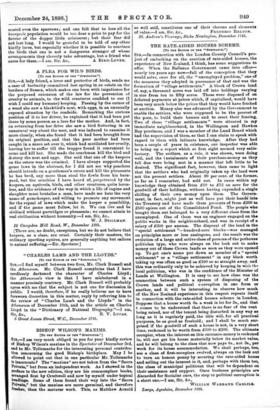THE RATE-AIDED HOUSES SCHEME. [To THE EDITOR OF THE "
BPseraroz."] SIR,—In connection with the London County Council's pro- ject of embarking on the erection of rate-aided houses, the experience of New Zealand, I think, has some suggestions to offer. When the Ballance Government came into office— nearly ten years ago now—full of the conception that they would solve, once for all, the "unemployed problem," one of the measures they adopted in pursuance of that end was the formation of "village settlements." A block of Crown land of, say, a thousand acres was laid off into holdings varying in size from ten to fifty acres. These were disposed of on deferred payments at prices which, if capitalised, would have been very much below the prices that they would have fetched at auction. Money also was advanced by the Government to enable the settlers, who were supposed to be the poorest of the poor, to build their houses and to erect their fencing. Two of these "village settlements" were situated in my immediate neighbourhood, in the Wellington and Hawke' Bay provinces, and I was a member of the Land Board which had the supervision of them, so that I can claim to speak with regard to them with intimate knowledge. After they had been a couple of years in existence, our inspector was able to bring up a report which at first sight seemed very satis- factory. The settlers, as a rule, it was shown, were doing well, and the instalments of their purchase-money as they fell due were being met in a manner that left little to be desired. The significant fact, however, then came to light that the settlers who had originally taken up the land were not the present settlers. About 90 per cent. of the former, as far as I remember, had sold out. In cases within my knowledge they obtained from 210 to 212 an acre for the goodwill of their holdings, without having expended a single shilling of their own money upon them. The Govern- ment, in fact, might just as well have put their hands into the Treasury and have made them presents of from 2200 to 2500 apiece out of the Consolidated Fund. The people who bought them out belonged to a very different class from the unemployed. One of them was an engineer engaged on the public works in the neighbourhood, and was in receipt of a salary of 2300 per annum. The disposal of the land in the "special settlement "—hundred-acre blocks—was managed on principles more or less analogous, and the result was the evolution of a large and active class of persons of the pothouse politician type, who were always on the look oat to make money out of these Crown lands as soon as they were opened up. To get one's name put down as member of a "special settlement" or a "village settlement" in any block worth taking up was often as good as 2100 or so straight away, and this was ordinarily only to be achieved by keeping in with the local politician, who was in the confidence of the Minister of Lands at Wellington. It is easy to see how close was the connection between such a system of disposing of the Crown lands and political corruption in one form or another, and it will be interesting to observe how much of the New Zealand experience in this respect repeats itself in connection with the rate-aided houses scheme in London. Suppose that a house worth 6s. a week is let for 3s., and that t comes to be understood that there is no fear of the rent being raised, nor of the tenant being disturbed in any way so long as it is regularly paid, the title will, for all practical purposes, be as good as freehold; and I shall be much sur- prised if the goodwill of such a house is not, in a very short time, reckoned to be worth from £100 to 2200. The ultimate occupier, when the interest on this entrance-money is reckoned in, will not get his house materially below its market value, and he will belong to the class that now pays 6s., not 38., per week for its house accommodation. We shall perhaps, too, see a class of first-occupiers evolved, always on the look out to turn an honest penny by securing the rate-aided house and selling out the interest in it, and, perhaps with them too, the class of municipal politician that will be dependent on their assistance and support. Once business principles are discarded for Socialist ones, the step to political corruption is a short one.—I am, Sir, Ac.,
WILLIAM WARRAND
Largo, Ayrshire, December 16th.






































 Previous page
Previous page